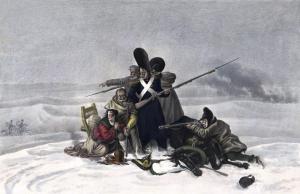The further the army marched, the more it broke down. More than ever, the survivors needed the help of others. Faber du Faur records one example of a dire situation. A scene that was repeated many times.
Near Bobr, 23 November
“Although there had been something of a thaw over the last couple of days, this was soon replaced by heavy snow – something that impeded our march. Russian columns shadowed us, but at a distance as they too were suffering from the intemperate climate. However, we were still surrounded by clouds of Cossacks and bands of armed peasants, and this made it very dangerous to stray from the main road or lag behind.”
“Here we see a typical scene – something that happened every day. A wounded officer and his wife, after considerable efforts to get this far, have just seen the horse pulling their sledge collapse and die. The bulk of the army has already passed by but there is still some hope that the rearguard might be able to assist them. But night is approaching and the rearguard is some way off – the smoke in the distance is a sign that it has just left a village and has set it on fire. The Cossacks appear. The compassion and bravery of a handful of soldiers serves as some encouragement for the unlucky pair but they are now without transport and if the rearguard does not take pity on them they will be abandoned and captivity will follow. Either that or they will perish, victims of the murderous climate.”
Source:
With Napoleon in Russia: The Illustrated Memoirs of Major Faber du Faur, 1812, edited by Jonathan North


